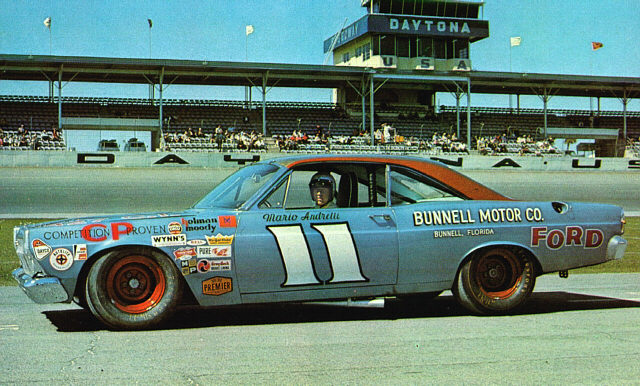Open-wheel drivers face same challenges as Mario
Franchitti is preceded in his jump to NASCAR by former open wheelers Jacques Villeneuve, Juan Montoya, Scott Speed and Sam Hornish Jr., among others. A variety of opinions exist as to why these men are making the move.
 |
|
Andretti in his Daytona 500 winning Ford |
"From where I'm sitting, it is probably because of the money [in NASCAR]," said Mario Andretti, a multi-series champion who crossed over to NASCAR and won the 1967 Daytona 500.
"Every individual would give you a different reason. I think the strongest one might be financial. It's not the only motivating factor but it is a strong one. And right now, the best chance to earn some money is NASCAR."
Others appear a bit stumped as to why these drivers, all of whom have won championships in their respective series, would venture into the vastly different world of NASCAR.
"This makes no sense," SPEED reporter Robin Miller said. "Neither Franchitti nor Jacques Villeneuve need the money. Jacques was making $20 million a year driving Formula One. These guys have already made it financially and have won major championships, so maybe they look at this as their 401k years."
Despite the varying opinions as to the motivation behind the open wheelers' departure to NASCAR, most agree that if open wheel racing currently was a healthier series, this trend would not be in effect.
"Looking at certain drivers who have pretty much been open wheel the majority of their career, if open wheel was what it should be, I don't think they'd even be thinking of leaving," Andretti said.
"Open-wheel racing is such a dead industry now," Miller lamented. "It's so hard to get money and there's so little sponsorship. Right now, Champ Car and the IRL have only limited seats in which drivers can make a decent living. Open wheel racing hasn't provided a platform for these guys to succeed, especially these young kids.
"When I go to the sprint car races, all these kids are talking about the NASCAR development deals," he continued. "They're not even looking at the Indy 500 because they know it's a dead end and they have no chance unless they have $4 or $5 million to bring to the table. Again, NASCAR wins because it has a viable ladder system in place that is supportive and you can be taken right to the top. You just have to bring your helmet and your talent and that's the way racing is supposed to be."
Despite all the talent and accolades these drivers hold, anytime the new kid on the block comes knocking on the door, he usually has to prove himself first.
"I thought it might be hard to be accepted [in NASCAR] but it really wasn't because across the board, the racing community has camaraderie," Andretti said. "Among the drivers, I never felt like I was out of place or not accepted. If you earn your respect and you don't do stupid things, and you show that you have respect for them and you do well, you'll be respected back.
"These guys are well-established in their field and the drivers know the quality of driver they're dealing with," Andretti continued. "These guys are not fools – they're not going to do stupid things. There was a lot of speculation about Juan Montoya at first and all that was dispelled pretty quickly and I think it's going to be the same with these guys. If you're going to make the move and make the commitment, you've got to deal with all these elements."
Being welcomed by the NASCAR fans might prove a more challenging order, though. More at NASCAR.com
